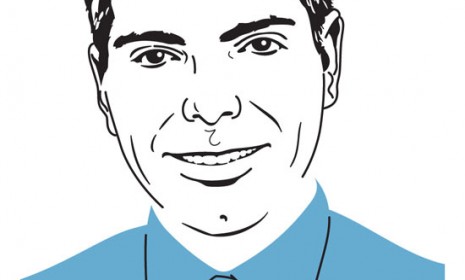Why is MSNBC aping George Orwell's villains?
Melissa Harris-Perry apparently thinks children belong to society rather than their families. Come on.


A free daily email with the biggest news stories of the day – and the best features from TheWeek.com
You are now subscribed
Your newsletter sign-up was successful
When Al Sharpton neglected the words "under God" from his recent MSNBC "Lean Forward" ad (which did mention that we are "one nation, indivisible…"), it predictably aroused controversy.
For a network struggling to compete with Fox News, buzz isn't a bad thing. And so, is it absurd to think that MSNBC's most recent ad, which implies that children don't belong to their families, but instead, to the collective community, was a calculated attempt to troll us?
If it was an intentional strategy, it worked. Melissa Harris-Perry's "Lean Forward" spot has some observers up in arms — and rightly so.
The Week
Escape your echo chamber. Get the facts behind the news, plus analysis from multiple perspectives.

Sign up for The Week's Free Newsletters
From our morning news briefing to a weekly Good News Newsletter, get the best of The Week delivered directly to your inbox.
From our morning news briefing to a weekly Good News Newsletter, get the best of The Week delivered directly to your inbox.
For one thing, the ad is premised on a canard. Harris-Perry begins by saying, "We have never invested as much in public education as we should have." But as Garrett Quinn notes at Mediaite, "We spend more on education per student than every country in the world according to the latest OECD Education at a Glance report."
Of course, the real controversy comes next, when Harris-Perry explains why we don't invest in public education. In her world, it's because
we've always had a private notion of children, your kid is yours and totally your responsibility. We haven't had a very collective notion of these are our children. So part of it is we have to break through our kind of private idea that kids belong to their parents or kids belong to their families and recognize that kids belong to whole communities. (Emphasis mine.)
Sure, it's true that we need strong communities and institutions to help grow strong Americans. But the primary responsibility rightly belongs to the parents. Family is the fundamental building block of society.
And here's the (mostly) unspoken problem: The notion that children do not really belong to their families, but rather, to the state (or "community") is straight out of the "Authoritarianism 101" playbook.
A free daily email with the biggest news stories of the day – and the best features from TheWeek.com
The best way to control tomorrow is to control today's children. This has been tried by various regimes throughout history.
Because it's sometimes dangerous for observers to use historical parallels to explain such things, I'll use some allegorical ones.
In George Orwell's 1984, we find this dystopian observation taking place in the fictional land of Oceania:
The family could not actually be abolished, and, indeed, people were encouraged to be fond of their children, in almost the old-fashioned way. The children, on the other hand, were systematically turned against their parents and taught to spy on them and report their deviations. The family had become in effect an extension of the Thought Police. It was a device by means of which everyone could be surrounded night and day by informers who knew him intimately.
Orwell's Animal Farm provides us with yet another example. In this instance, Napoleon the pig (who is said to represent Stalin) declares that "the education of the young was more important than anything that could be done for those who were already grown up."
And so, when two dogs living on animal farm give birth to puppies...
As soon as they were weaned, Napoleon took them away from their mothers, saying that he would make himself responsible for their education. He took them up into a loft which could only be reached by a ladder from the harness-room, and there kept them in such seclusion that the rest of the farm soon forgot their existence.
As you might recall from the book, at some later point, these same puppies — now "as fierce-looking as wolves" — were used by Napoleon to seize complete control of the farm.
The message is clear: Taking children away from their parents will come back to bite us in the end.
Matt K. Lewis is a contributing editor at TheWeek.com and a senior contributor for The Daily Caller. He has written for outlets including GQ Politics, The Guardian, and Politico, and has been cited or quoted by outlets including New York Magazine, the Washington Post, and The New York Times. Matt co-hosts The DMZ on Bloggingheads.TV, and also hosts his own podcast. In 2011, Business Insider listed him as one of the 50 "Pundits You Need To Pay Attention To Between Now And The Election." And in 2012, the American Conservative Union honored Matt as their CPAC "Blogger of the Year." He currently lives in Alexandria, Va.
-
 6 of the world’s most accessible destinations
6 of the world’s most accessible destinationsThe Week Recommends Experience all of Berlin, Singapore and Sydney
-
 How the FCC’s ‘equal time’ rule works
How the FCC’s ‘equal time’ rule worksIn the Spotlight The law is at the heart of the Colbert-CBS conflict
-
 What is the endgame in the DHS shutdown?
What is the endgame in the DHS shutdown?Today’s Big Question Democrats want to rein in ICE’s immigration crackdown
